Final Report on the RSA Research Network on Infrastructural Regionalisms (NOIR)
ORGANISERS DETAILS
Jean-Paul D. Addie, Georgia State University, Michael R. Glass, University of Pittsburgh and Jen Nelles, Oxford Brookes University.
Report
Between 2019 and 2023, the RSA Research Network on Infrastructural Regionalisms (NOIR) has challenged regional studies to attend to infrastructural questions by critically unpacking how infrastructure shapes regions, lives, and developmental pathways. Questions of how to scale and manage infrastructural systems are not new (Glass, 2018; Plotch and Nelles, 2023; Radford, 2013), but they have taken on pressing salience at the current juncture. In the years following the 2008 Global Financial Crisis, governments around the world have (re-)embraced infrastructure development to pursue their economic and territorial ambitions (Schindler and Kanai 2021) while an ‘infrastructural turn’ has matured across the social and policy sciences (Dodson, 2017; Monstadt and Coutard, 2019). The confluence of these applied and academic considerations has positioned infrastructure systems as contested political objects. By forging intellectual and professional connections between regional studies and infrastructure scholarship, NOIR has sought to develop a novel perspective on the regional question, which places the region at the center of the ‘infrastructural turn’.
NOIR’s work began in earnest even before the network officially launched. In April 2019, we organized panels at the American Association of Geographers Annual Meeting in Washington DC, and the Annual Meeting of the Urban Affairs Association in Los Angeles, featuring academic and practitioner perspectives on the infrastructural challenges of their home regions. The conceptual and applied issues they raised—surrounding, for example, institutional complexity, diffuse governance, path dependency, spectacular and banal development, equity, and temporality—helped consolidate NOIR’s thematic agenda and demonstrate the value of asking why is a regional perspective on infrastructure important and what new frontiers does it open for the discussion of infrastructure? Over the next four years, the network’s directors, members, and collaborators interrogated these questions through various workshops, panels, conference sessions, and plenaries. Each has contributed to the development and mobilization of a regional approach to the infrastructure turn—that we term ‘infrastructural regionalism’—emphasizing: (1) interdisciplinary research; (2) infrastructure and regional governance; (3) ‘seeing like a region’; and (4) variegated regional lives. The onset of the COVID-19 pandemic shortly after NOIR’s launch presented significant challenges to organizing and operating the network. However, thanks to the RSA graciously extending support for the network for an additional year, NOIR was able to pivot, holding several key events including:
- Event 1: NOIR Special Session Defining the Terrains of Regional Infrastructure
September 2019, RSA North American conference, Montreal
- Event 2: NOIR Workshop on Water Infrastructure and Regional Governance (5 panels)
September-October 2020, University of Pittsburgh, virtual event
- Event 3: NOIR Workshop on Infrastructural Times (6 panels)
June 2021, RSA Regions in Recovery e-festival, virtual event
- NOIR Special Session: Keynote Panel ‘100 years of infrastructural regionalism: Exploring the dynamic interaction between infrastructure and regional governance in metropolitan New York’
March 2022, RSA Regions in Recovery e-festival, virtual event
- Event 4: NOIR Special Sessions: Regional Infrastructure, Infrastructural Regionalism: Cases, Concepts, Contexts (3 panels)
June 2023, RSA Annual Conference Ljubljana
Conversations across these events have been wide-ranging. Infrastructural regionalism is a huge topic. Our field of vision is often limited to the experiences of specific places (case studies) or specific types (or subtypes) of infrastructure. Things get even more complex when infrastructure does (or should) cross local jurisdictional boundaries and, in so doing, becomes regional. Intellectual debates during the NOIR water infrastructure workshop consequently stressed the importance of grappling with distinct knowledge and knowledge claims emerging at the intersection of varied epistemic communities and differing scales/territories (from the household to supra-region). Many contributors pointed to the challenges facing inclusive and equitable decision-making when infrastructure governance is present both as a problem to be fixed (technocratic, political economy approaches) and a reality of the lived (assemblage, anthropological inquiry). The complexity of infrastructure-based ‘wicked problems’ further illustrated the significance of scale in framing and engaging socio-technical complexity. Approaching questions of regional water governance at micro, meso, and macro scales, as our interlocutors revealed, foregrounds different actors and processes and with this, differing ways to intervene—which in turn invoke complex and unexpected implications.
Vantage point profoundly matters in this context, both relating to the importance of gender, race, ethnicity, and citizenship in shaping access to water resources and the social, political, and geographic centrality/marginality of regional inhabitants. Exploring questions of time, in addition to those of space, territory, scale, during the Infrastructural Times workshop drew further attention to the divergent ways urban and regional spaces are experienced and produced temporally. This framing deepened NOIR’s investigations into the impact of infrastructure on regional lives, notably by considering the juxtaposition of more formalized modalities of planned ‘project time’ and top-down regional visioning with the multiplicity of qualitatively distinct forms of everyday ‘lived time’.
Exchanges at NOIR most recent panel sessions in 2023 flagged most prominently the need—and challenges—of conveying social scientific and wider academic conversations around infrastructure development with the timeframes and applied concerns of policymakers and practitioners. While there are obvious synergies between these two forms of knowledge production and action, more attention needs to be paid on the demands of aligning the concerns and time horizons of each sector, while recognizing the distinct contributions each makes to the development of more equitable, inclusive, and resilient regional spaces.
NOIR has captured these issues and debates through two main types of research output. First, as co-directors, we have published a series of papers that develop the network’s overarching conceptual framework for understanding and researching ‘infrastructural regionalism’. We have charted the evolution of infrastructure as a regional concern through four decades of scholarship in Regional Studies (Glass, Addie, and Nelles, 2019), and outlined why we need to regionalize scholarship in the on-going ‘infrastructure turn’ in the social and policy sciences. The network’s cornerstone position paper, published in Regional Studies, Regional Science, argues for the need to apply a regional perspective to infrastructural studies which too often prioritize local scales and urban imaginaries (thinking about infrastructure through the region) while engaging infrastructure as empirical and conceptual problematic to interrogate regional processes (thinking about the region through infrastructure) (Addie, Glass, and Nelles, 2020). A third contribution, published in Infrastructuring Urban Futures (Wiig et al., 2023) brings NOIR’s regional perspective into dialogue with wider critical urban and infrastructure scholarship while demarcated avenues for future research on regional infrastructural fetishes, fragments, and futures (Glass, Nelles, and Addie, 2023). These papers have played a central role in reaffirming the importance of the region to questions of infrastructure and the centrality of multiple infrastructural systems to material and discursive processes of regionalization—cumulatively, they have been downloaded over 14,000 times and cited over 100 times according to Google Scholar (as of November 2023).
Second, research galvanized and consolidated through NOIR events has resulted in two major publication projects. The first is a special issue on Water Infrastructure and Regional Governance, forthcoming in the journal Territory, Politics, Governance. Across nine research articles (complemented by an editorial introduction and afterword), this special issue advances our understanding of the relationships between the materiality and governance arrangements of water infrastructure and processes of regionalization. The range of conceptual approaches and scalar imaginaries featured—from the ‘hydro-racial fix’ in Atlanta (Milligan et al, 2022) and city waterfront assemblages in Seattle (Taufen et al, 2022) to internal colonization in Singapore (Usher, 2022) and indigenous water knowledges in Lima (Hoefsloot et al, 2022)—illustrate the incredible breadth and complexity of infrastructural regionalisms. Bringing these perspectives into dialogue provides a versatile basis for us to comparatively examine how formal and informal regional spaces, communities, and governance dynamics are shaped, experienced, and changed through water infrastructure systems. In the context of the NOIR network, these studies vitally contribute to the development of conceptual and methodological tools that illustrate how infrastructures produce new regional formations and demonstrate that the analytical purchase of infrastructure is not fixed but rather relational, with scale being a crucial matter.
NOIR has also produced an edited volume entitled Infrastructural Times: Temporality and the Making of Global Urban Worlds, published by Bristol University Press (Addie, Glass, and Nelles, forthcoming 2024). The book disrupts conventional notions of time through a robust examination of the relations between temporality, infrastructure, and urban and regional development. Conceptually rich and empirically detailed studies of diverse cities and regions from Toronto and Berlin to Cario and Jayapura encompass infrastructural systems including transportation, energy, and water to bridge often-siloed technical, political-economic, and lived perspectives. This interdisciplinary dialogue directly integrates NOIR’s key thematic interest in thinking with and across differing knowledge communities. At the same time, focusing on questions of time and temporality shone a novel light on NOIR’s interest in ‘seeing like a region’, thus unpacking some of the implication of ‘when’ regional space becomes visible, who can act and be patient, and shape imaginaries that direct us to the future—and what those possible futures may be.
NOIR has maintained an open approach to network membership. Our events have not been limited to ‘formal’ members of the network, enabling us to collectively develop collaborations, and substantively interact with, a much wider group, often gaining new members from participant engagement. NOIR events have elevated the work of over 50 students, early-career, and established researchers with a balanced representation in affiliations and geographical focuses and a diversity of interests in infrastructure and regionalism. Over 250 people have attended the network’s conferences sessions, panels, and workshops, while the network maintained an active website (www.noir-rsa.com) and Twitter account (@NOIR_RSA).
To date, NOIR’s members and collaborators have fostered vibrant interdisciplinary and multi-scalar debates regarding how regions are constructed, territorialized, governed, and experienced. Yet questions remain and more work needs to be done. Differing national contexts and the divergent infrastructural systems (water, transport (active and informal), energy, knowledge-based) illustrate the value of inter-sectoral and geographic comparative work at several scales. Rather than moving towards a singular theory of infrastructural regionalism, NOIR’s conceptual agenda has provided a robust framework and provocations to address social and political issues arising at the intersection of infrastructure and regional studies. The value of this work is readily apparent at what is a crucial political, policy, and planning inflection point. The geopolitics of infrastructural expansion, wars in Ukraine and Gaza, post-COVID restructuring, and the uneven rollout, outcomes, and implications of infrastructure development—especially in ‘left behind’ places—point to the need for enhanced practitioner and policy engagement and the expansion of infrastructural regionalism inquiries into non-Western and Global South contexts. We remain inspired by the capacity of NOIR’s interlocutors—and work informed and supported by this RSA Research Network (e.g., Alizadeh et al, 2022; Bailey et al, 2021; Gansauer et al, 2023; Horan, 2023; Sayan, and Nagabhatla, 2022)—to tackle this task.
References:
Addie, J.-P. D., Glass, M. R., and Nelles, J. (2020). Regionalizing the infrastructure turn: A research agenda. Regional Studies, Regional Science, 7(1), 10-26.
Addie, J.-P. D., Glass, M. R., and Nelles, J. (eds.) (forthcoming, 2024). Infrastructural Times: Temporality and the Making of Global Urban Worlds. Bristol: Bristol University Press.
Alizadeh, T., Clements, R., Legacy, C., Searle, G., and Kamruzzaman, M. (2022). Infrastructure governance in times of crises: A research agenda for Australian cities, Urban Policy and Research, 40(1), 1-14.
Bailey, D., Crescenzi, R., Roller, E., Anguelovski, I., Datta, A., and Harrison, J. (2021). Regions in Covid-19 recovery, Regional Studies, 55(12), 1955-1965
Dodson, J. (2017). The global infrastructure turn and urban practice, Urban Policy and Research, 35(1), 87-92.
Gansauer, G., Haggerty, J. H., Smith, K. K., Haggerty, M. N., and Roemer, K. F. (2023). Can infrastructure help ‘left behind’ places ‘catch up?’ Theorizing the role of built infrastructure in regional development, Cambridge Journal of Regions, Economy and Society, DOI: 10.1093/cjres/rsad032
Glass, M. R. (2018). Navigating the regionalism-public choice divide in regional studies, Regional Studies, 52(8), 1150-1161
Glass, M. R., Addie, J.-P. D., and Nelles, J. (2019). Regional infrastructures, infrastructural regionalism. Regional Studies, 53(12), 1651-1656.
Glass, M. R., Nelles, J., and Addie, J.-P. D. (2023) ‘On fetishes, fragments, and futures: Regionalizing infrastructural lives’, in A. Wiig, K. Ward, T. Enright, M. Hodson, H. Pearsall, and J. Silver (eds.) (2023). Infrastrucuting Urban Futures: The Politics of Remaking Cities. Bristol: Bristol University Press.
Hoefsloot, F. I., Martínez, J. and Pfeffer, K. (2022). An emerging knowledge system for future water governance: Sowing water for Lima, Territory, Politics, Governance, DOI:10.1080/21622671.2021.2023365.
Horan, C. (2023). Neoliberalizing infrastructure: Financing public transportation in Greater Boston, Journal of Urban Affairs, DOI: 10.1080/07352166.2023.2200951
Milligan, R., Addams, E. A., Wheeler, C., and Vermillion, N. (2022). The hydro-racial fix in infrastructural regions: Atlanta’s situation in a regional water governance conflict, Territory, Politics, Governance, DOI:10.1080/21622671.2022.2134197
Monstadt, J., and Coutard, O. (2019). Cities in an era of interfacing infrastructures: Politics and spatialities of the urban nexus. Urban Studies, 56(11), 2191-2206.
Plotch, M. P. and Nelles, J. (2023). Mobilizing the Metropolis: How the Port Authority Built New York. Ann Arbor: University of Michigan Press.
Radford, G. (2013). The Rise of the Public Authority: Statebuilding and Economic Development in Twentieth Century America. Chicago: University of Chicago Press.
Sayan, R. C., and Nagabhatla, N. (2022). The co-constitution of regional politics and massive infrastructures in the Transaqua water project, Territory, Politics, Governance, DOI: 10.1080/21622671.2022.2043178
Schindler, S., and Kanai, M. (2021). Getting the territory right: Infrastructure-led development and the re-emergence of spatial planning strategies. Regional Studies, 55(1), 40-51.
Taufen, A., Hoffman, L. M., and Yocom, K. P. (2022). Assemblage as heuristic: unveiling infrastructures of port city waterfronts, Territory, Politics, Governance, DOI:10.1080/21622671.2022.2055631
Usher, M. (2022). Territory, hydraulics, biopolitics: Internal colonization through urban catchment management in Singapore, Territory, Politics, Governance. DOI:10.1080/21622671.2022.2056503.
Wiig, A., Ward, K., Enright, T., Hodson, M., Pearsall, H., and Silver, J. (eds.) (2023). Infrastrucuting Urban Futures: The Politics of Remaking Cities. Bristol: Bristol University Press.
NOIR Network Photos
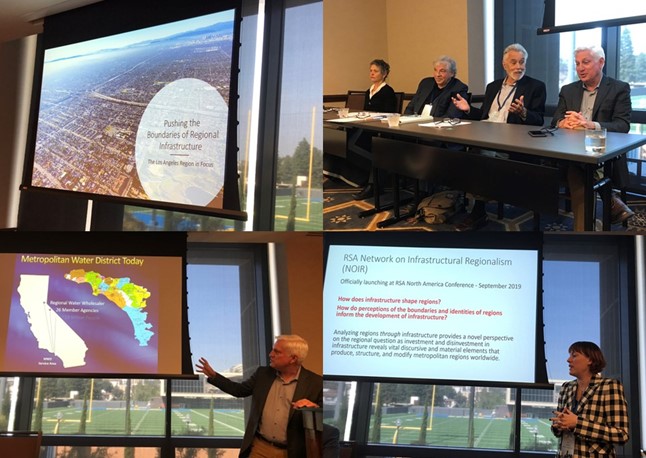
Pushing the boundaries of regional infrastructure in Los Angeles, April 2019.
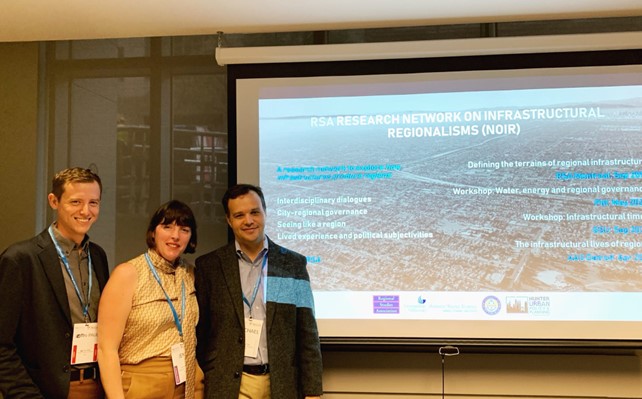
Launching NOIR at the RSA North American Conference, Montreal, September 2019.
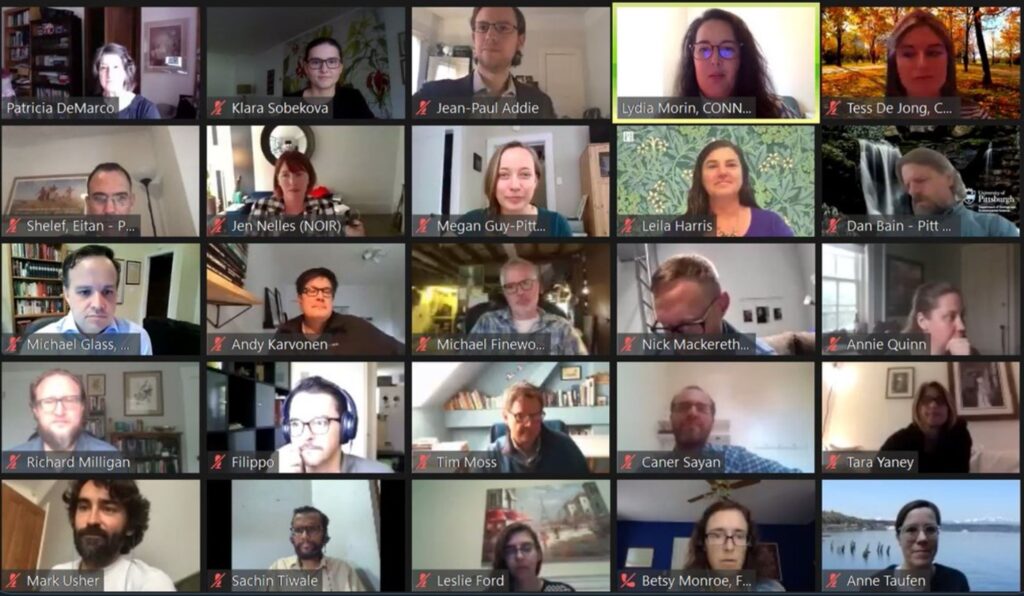
Welcome to the NOIR workshops on Water Infrastructure and Regional Governance in September 2020.
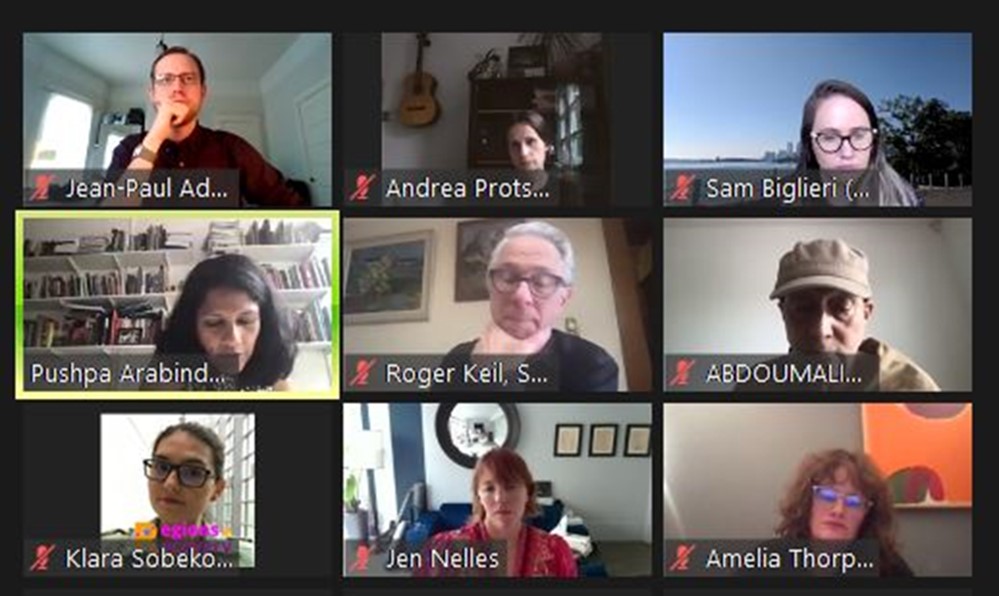
Workshopping papers with the contributors to NOIR Infrastructural Times workshop, June 2021.
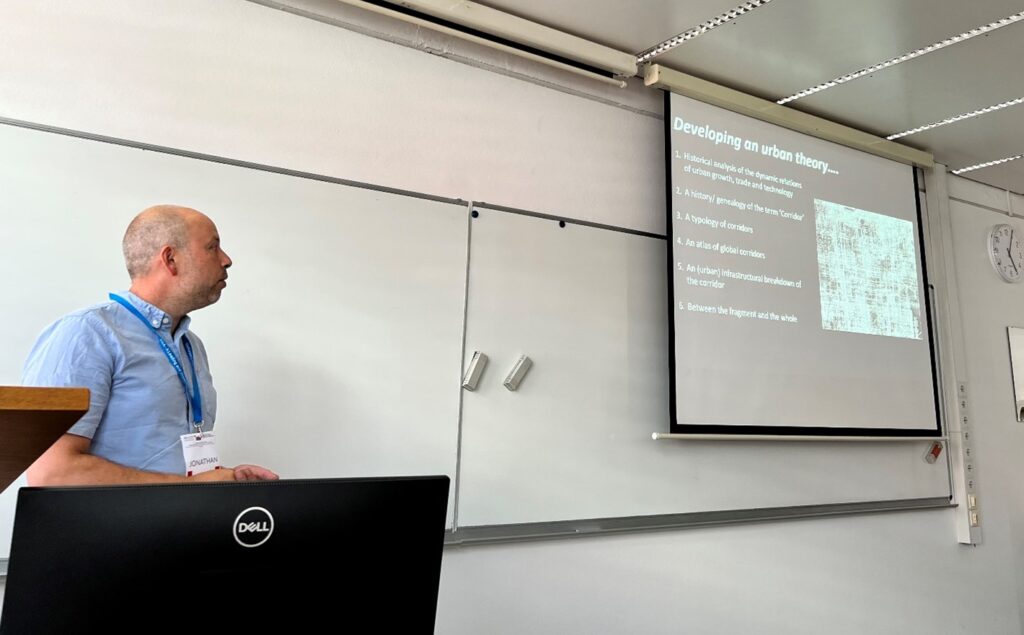
Jonathan Silver (University of Sheffield) delivering the NOIR keynote lecture on ‘Corridor Urbanization’, Ljubljana, June 2023.



